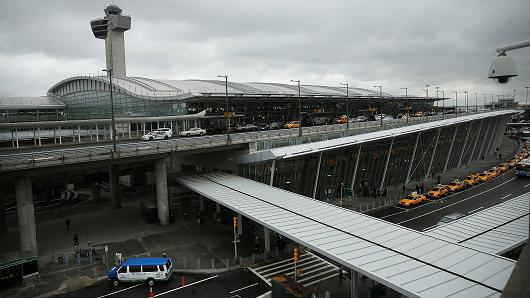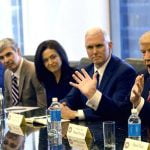Less than 24 hours after President Donald Trump signed an executive order clamping down on refugee admissions and temporarily restricting travelers from seven predominantly Muslim countries, the impact was already resonating at airports around the world.
There was confusion Saturday at New York’s John F. Kennedy International Airport where a dozen people were detained and some separated from family members, according to lawmakers and attorneys scrambling to get them released and struggling to interpret the new rules.
Two of the 12 are Iraqi refugees, and one of them — identified as Hameed Khalid Darweesh — was released Saturday afternoon following his detention, said New York Rep. Jerrold Nadler.
“I am very, very thankful to all the people who can support,” Darweesh told reporters as he was surrounded by dozens of protesters carrying signs that read “Refugees welcome” and “No ban, no wall.”
“America is the greatest nation,” Darweesh added. “America is the greatest people in the world.”
More from NBC News:
Republican Party retreat sidetracked by Trump ‘distractions’
Did Obama defeat ISIS in Libya?
Britain’s ‘Mad King’ Letters: ‘America is lost!’
Nadler said it was unclear why Darweesh was released while the other 11 remained held at the airport Saturday afternoon. They could be transferred to an immigration detention center in New Jersey to meet with immigration lawyers, Nadler added.
“This should not be happening in America,” he told reporters. “The executive order is a gross violation of our standards, our norms and the spirit of our Constitution.”
A senior Trump administration official told reporters that the two Iraqi men, which included Darweesh, were getting waivers allowing them to stay in the United States. The men were mentioned in a New York Times report Saturday, and it was unclear whether the remaining people detained at Kennedy airport would also receive such waivers.
Human rights attorneys could not immediately say which additional affected countries — Syria, Iran, Sudan, Somalia, Yemen or Libya — the others at Kennedy airport come from.
Darweesh, the Iraqi refugee, was an interpreter working on behalf of the U.S. government in Iraq from 2003 to 2013 and had received a special Iraqi immigrant visa to relocate to America last week with his family, attorneys said.
Although Darweesh was detained upon arrival into the United States, his family was not — showing how the executive order is being enforced so “arbitrarily,” said Mark Doss, a supervising attorney at the nonprofit International Refugee Assistance Project. The organization is part of a group attempting to secure the release of the two Iraqi refugees.
The men, who were identified in a lawsuit filed by the American Civil Liberties Union as Darweesh and Haider Sameer Abdulkhaleq Alshawi, whose wife and child are lawful permanent residents of Houston.
Alshawi is on a “follow to join” visa, according to the ACLU.
The two Iraqi men arrived on different flights and were held after the executive orders came into effect at midnight.
The American-Arab Anti Discrimination Committee (ADC) also said it was receiving reports that “green card holders and other visa holders have been denied boarding and admission into the United States” at airports. NBC News was unable to immediately verify the ADC’s claims, and calls requesting further information went unanswered.
Mohammed Al Rawi, a Los Angeles County employee, said his 69-year-old Iraqi father was turned away from his connecting flight in Qatar before he could leave for Los Angeles. His passport was taken before he was sent back to Baghdad, he told NBC News.
“He’s a senior. Why would anyone feel threatened by someone like him?” Al Rawi asked. “This actually makes us as a country look bad. … I am generally concerned about all US citizens in the Middle East. Targeting Muslims this way puts people in horrible situations.”
‘HARMFUL AND HASTY
In Cairo, Egypt, two sources close to airport security told NBC News that an Iraqi family of five from the city of Erbil had been prevented from boarding a flight to New York.
NBC News was unable to immediately confirm whether this was related to the travel restrictions. A United Nations refugee agency spokesperson referred questions on the Iraqi family to U.S. authorities.
Trump’s executive order suspended admission of all refugees to the U.S. for 120 days. It also indefinitely bans refugees from Syria and restricts entry to the country for people from six other predominantly-Muslim nations for 90 days.
In signing the order, Trump pledged to “keep radical Islamic terrorists out of the United States of America.”
The State Department and Customs and Border Patrol on Saturday were still devising the formal rules for who is eligible for waivers — such rules were not written up before the executive order was implemented.
The Trump administration also has yet to issue guidance to airports and airlines on how to implement the executive order. “Nobody has any idea what is going on,” a senior Homeland Security official told NBC News.
In addition, the order applies to both refugees who are still “in transit” and U.S. green card holders from the affected Muslim-majority countries currently overseas, a senior administration official said. Those people would also need to apply for a waiver if they want to return to America, the official added.
The official said it would have been “reckless and irresponsible” to issue guidelines before the executive order was signed because of security reasons.
The International Rescue Committee called the decision to halt the U.S. refugee resettlement program a “harmful and hasty” decision.
Meanwhile, the United Nations refugee agency and International Organization for Migration called on the Trump administration to continue offering asylum to people fleeing war and persecution, saying its resettlement program was vital.
In Paris on Saturday, French Minister of Foreign Affairs Jean-Marc Ayrault said Trump’s orders “can only worry us.”
“Welcoming refugees who flee war and oppression is part of our duty,” Ayrault said in comments carried by Reuters.
Qatar Airways issued a statement on its website that said nationals from Syria, Iraq, Iran, Sudan, Somalia, Yemen and Libya may only travel to the U.S. if they are in possession of a resident green card or specific visas usually granted to government employees, individuals traveling to the United Nations or employees of international organizations.
It said the information was “per an Immigration Advisory Notice from U.S Customs and Border Protection with regards to new U.S immigration entry requirements.”
Dutch Airline KLM said they couldn’t fly seven passengers to the U.S. because they originated from one of the seven banned countries
“We were a bit surprised we had to implement this immediately but all airlines are doing so,” said KLM spokeswoman Manel Vrijenhoek.
Tech giant Google also issued a statement Saturday revealing its worries about the executive actions.
“We’re concerned about the impact of this order and any proposals that could impose restrictions on Googlers and their families, or that could create barriers to bringing great talent to the US,” the statement read. “We’ll continue to make our views on these issues known to leaders in Washington and elsewhere.”
source”cnbc”






